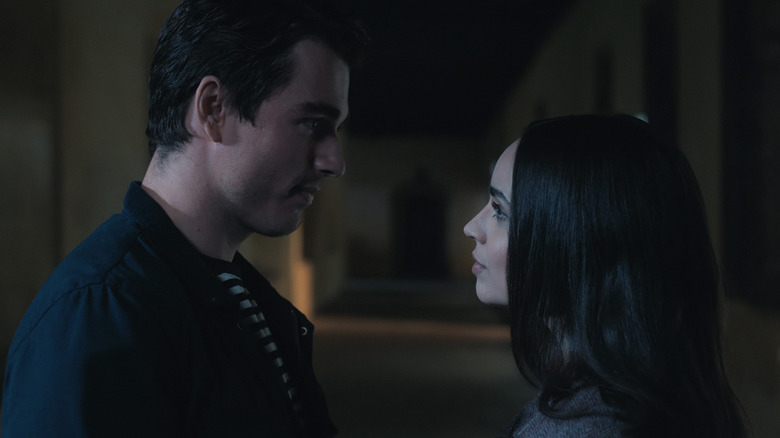My Oxford Year's Controversial Ending Explained By Director
This post contains major spoilers for "My Oxford Year"
Sofia Carson is carving out a nice little career for herself as the queen of Netflix romance. The former Disney Channel actress played an aspiring singer-songwriter who fell for a Marine in the 2022 romantic drama "Purple Hearts" before fronting the hit romantic comedy "The Life List," which dominated Netflix's top charts in 2025. She also found time to play Taron Egerton's wife in the "Die Hard"-like thriller "Carry-On" in 2024, and has now returned for more romance with "My Oxford Year."
This latest Carson-led romantic drama is directed by Iain Morris, who British viewers will know best as the creator of "The Inbetweeners." There's no bus wankers in sight in "My Oxford Year," though. Just a lot of brooding, cheesy dialogue, and even a bit of charm. The film was written by Allison Burnett and Melissa Osborne, but the actual genesis of this movie is a tad convoluted, so bear with me.
In 2018, Julia Whelan published her debut novel "My Oxford Year," but rather than being directly inspired by her own experience as a visiting student at Lincoln College, Oxford, she was actually producing a novelization of Burnett's original screenplay, "Oxford," to which she had already contributed rewrites. After the novel was released, Melissa Osborne gave Burnett's script an overhaul, which ultimately became the Netflix original. If you're confused, don't worry, because the film's plot is a lot less complex than its origin story. The ending, however, has proved surprisingly controversial, and now Morris has spoken out in defense of his streaming movie and its surprisingly upsetting ending.
My Oxford Year is a ridiculous romantic drama with a devastating ending
Basically, "My Oxford Year" is like 2023's bleakest comedy, "Saltburn," without any of the deviance or dodginess and a lot more Young Adult tropes and romance clichés. Sofia Carson plays Anna De La Vega, an American student who travels to England to study Victorian poetry for a year at the University of Oxford. Cue handsome English guy in the form of Corey Mylchreest's Jamie Davenport, a DPhil student and tutor who introduces himself by splashing Anna with his car. Of course, it doesn't take long for the exchange student to fall for his charms after she winds up in a class he's teaching.
The rest plays out like a BookToker's dream, with Jamie and Anna striking up a passionate romance that sees them quickly develop deep feelings despite their initial insistence that they're both just having "fun." There are some classic comic relief buddies to help lighten things up, which comes in handy when, out of nowhere, it transpires that Jamie has some horrible disease that's already taken the life of his brother. It's a classic romance novel twist that's also just a tad morbid but certainly gives the already dashing leading man a tragic element, thereby making him all the more achingly unattainable for Anna. That's especially so since he refuses to continue potentially life-saving treatments in favor of living his life to the fullest prior to his impending demise.
Look, "My Oxford Year" isn't trying to subvert the romance genre or provide some deep exploration of its themes. But it mostly knows what it is, and as a piece of Netflix binge fodder, it's perfectly acceptable — dare I say even a bit charming in its unabashed embrace of an idealized fantasy Oxford and its simplistic love story. As such, you might expect the film to deliver a full-on happy ending. It doesn't — and now the director has spoken on what is surely the biggest controversy of our time.
Throughout the movie, Jamie and Anna dream of traveling Europe, but the poor bloke kicks the bucket before they can abscond. The film sort of tricks you in that sense, though, as the finale shows the pair traveling the continent together before a quick transition reveals that Anna is actually there alone and that Jamie has indeed passed away. Naturally, fans weren't too impressed with this darkly hopeful denouement, especially since it was never even made clear just how long Jamie had left. But Iain Morris thinks everybody actually needed to be completely devastated by the ending of "My Oxford Year."
Iain Morris wanted to inspire hope with My Oxford Year (and make everyone really sad)
Judging by some of the social media reactions, viewers certainly didn't think the final moments of "My Oxford Year" constituted the best ending to a film. The ultimate scenes show Anna teaching the same class that Jamie taught at Oxford, confirming that she abandoned her plans to become a banker and embraced a more truthful existence becoming absorbed in the poetry she so loves (and presumably still making quite a bit of money by teaching at Oxford). It was this element that, according to Iain Morris, made the otherwise tragic ending tolerable.
Speaking to The Hollywood Reporter, Morris explained that he wanted "a sense of closure about [Jamie's] story, but without it being very literal." The director added that he felt the ending had hopeful and sad elements alike and that Anna's decision to stay in Oxford was the most important element of the whole thing, as it conveyed an important message about how to "live your truth." The director continued:
"What we want for her is to do what she should be doing that she's clearly good at that she has a passion for. We didn't want her to go back and work Goldman Sachs and be the cleverest marketing assistant or whatever she would start off as. I think that was important, feeling like she was doing what she should be doing."
But beyond inspiring the audience with hope, it seems Morris was perfectly aware of what he was doing in terms of making everyone really upset. "I really, really hope for everyone to be devastated," he said. "Like, I really want people in absolute bits. I would like everyone to just be crying and take away a sort of sense of hope. I'd love someone one day to say to me, 'It's my favorite film.'" It's not entirely clear how bumming everyone out would result in Morris' film becoming anyone's favorite, but there you go. Otherwise, if you're unconvinced by the director's explanation and absolutely hated the ending of "My Oxford Year," but were otherwise swept up in the romance of it all, it's worth noting the book ends on a more hopeful note.


